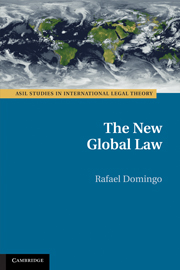Book contents
7 - Legal Principles of Global Law
Published online by Cambridge University Press: 06 July 2010
Summary
RULES-BASED PRINCIPLES AND PRINCIPLED RULES
Global law is configured as a legal order of principles. Whether the principles that I propose are accepted to either a greater or lesser degree will significantly depend on their incorporation into the Magna Charta of Humanity, once global law fully functions as a cohesive legal order. Until that time, the mission of principles will be to illuminate and inspire the new global law as requirements of justice in light of the reality of globalization.
I use the concept of principle here broadly in keeping with the etymology of the Latin principium, which means beginning, initiation, or origin. It is a compound of the adjective primus and the verb capere, and it means “the first thing it takes to realize a project.” Thus, the principles I propose are the first tools needed to shape a new legal global order. Articulated in brief statements, they appear here as rules, but that is not exactly what they are. Here I suggest a taxonomic distinction.
A rule – canon in Greek, kanun in Arabic – is a brevis rerum enarratio. Laws are not derived from rules (non ex regula ius sumatur) but rather rules from laws. Thus, the flow of any jurisprudential system ultimately leaves a deposit of legal rules. So it was with Roman law – a jurists' law (Juristenrecht) in which rules proliferated.
- Type
- Chapter
- Information
- The New Global Law , pp. 154 - 194Publisher: Cambridge University PressPrint publication year: 2010



